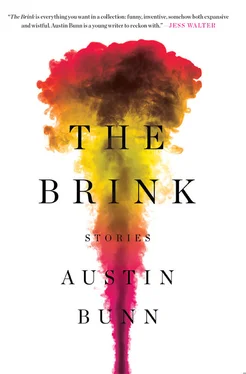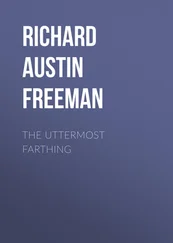The air was frigid, biting, even at noon. He could see the top of their neighbor’s white plumbing van over the fence. Graham stepped into the shadow of his garage, out of view, and laid the bag softly (how else?) on the hard-packed ground. It seemed vital to get the bag in the ground before Graham thought too hard or too much. He needed a shovel. If he dug deep and quick, the fact of it wouldn’t take hold. Before Em, back when Graham and Marlena traveled the country — they were hoboes for a couple of years there — they had a running joke: when things got bad, when they’d left some shameful evidence of themselves somewhere, he would rush into the car and say, “ Go, go, go! ” like a getaway, like the end of a heist, because you recalled a place less the faster you left it.
He left the bag and stepped into the garage. The wall had one empty spot for the shovel, next to the rake and the broken rake and the pitchfork that was a prop in some life he would never live. Then Graham remembered Aaron at his back door over the weekend, his presidential face, dressed in a thermal shirt and grimy jeans, shovel pieces in his hands. He said his shovel had snapped when he’d tried to attack a tree root. So he’d come through the door in the fence between their yards — installed by their prior neighbors, who imagined a community on the block and then promptly relocated to Houston — to ask to borrow theirs. Facing him on the back stairs, Aaron peeked around behind Graham, at the kitchen interior, and said, “Hey, Emma,” and Emma, at the island, smiled, and Graham wondered which men earned her attention and which her dismissal. In the yard, Aaron’s German shepherd, improbably named Schatzi, ran around, sniffing, pissing on the sapling Marlena had planted. Graham recalled the swell of masculine provisioning he felt escorting him to the garage, where he handed over his own shovel. Keep it as long as you need it, Graham said, while Aaron surveyed his wall of tools, his whole garage, as though he might find another tool he wanted.
Graham noticed a trowel in an empty flowerpot. It had a sparkly red handle. Marlena had bought it for Em, her very own trowel , to encourage gardening, though Em preferred to do anything but. Now that he thought about it, where had Em been yesterday? Or the day before? Graham’s thinking hit the wall of her routine: school, dinner on the couch, then up in her bedroom, earphones in, computer on and trilling. When did she look up long enough to get pregnant? God, he barely knew her.
He took the trowel grimly, knowing a bad decision the instant he gripped the handle.
He chose a spot near the pine tree, screened by the fence from the rear alley. The ground was dense and dry — Graham had to jab with two hands. The dirt made a pitiful pile until he reached sand a few inches down. He could hear the shepherd next door snorting in Aaron’s yard, pacing the fence line. Don’t bark, Graham willed. Don’t.
He’d done this once before. One summer in high school, he buried the family cat, a beloved throw pillow named Moe that had never quite understood that the road outside the house was a goddamn killing field. He buried her in the ground and surprised himself weeping inconsolably at the graveside, kneeling against his mother’s leg and discovering it was sweet and perfumed and cluttered the grief. The next summer, their neighbor set a fence and drove a backhoe into the ground right through the plot. That would not happen here.
Finally, a hole opened up. Deep enough, he thought. Graham set the bag in the hole and tucked the extra plastic in. It occurred to him that inside the plastic, nothing would rot. Generations on, you could dig this thing up and know just what was inside. He got the pitchfork from the garage and jabbed into the bag. The tines struck soft matter and he willed himself to think no further. Then he kicked dirt on top and tamped with his foot, delicately. He promised himself he would never tell anyone where this was. This was the absolute final time he would allow his eyes to fall on this spot. He was murmuring a half-remembered prayer when his cell rang inside the house.
It was Marlena, at the library. He found himself at the counter, phone in hand, unable to answer. If he moved, if he answered and so much as spoke the events of the last fifteen minutes aloud, a crack would spider its way through their entire lives. No one could know. If he called the police, Emma would go to jail, or he would. That is what happened in an area like this, where the pro-life ads on billboards — fetuses, forty feet tall! — promised good lives and loving parents to every single baby if you would just allow them into the world.
He let the air run out of his lungs. The phone went silent, and in the silence, he discovered he needed Marlena to know. She would know which lawyers to call, how to sit Em down and not destroy her. She worked at the branch library. She could parry anything.
She picked up at the first ring.
“I found something,” Graham said. “In the basement.”
Marlena sighed. “Did the sewer explode again? Because we’re staying at a hotel this time.”
“No, it’s not the sewer. You need to come home right now.”
“Tell me what’s going on.”
He looked out through the kitchen window. A strange shape moved out by the pine tree. Dirt kicked up in the air. He saw the shepherd’s black muzzle nose the grave.
“Get home,” Graham managed to say before he hung up.
As soon as the screen door slammed behind him, the dog turned and gripped the ground. A low growl escaped from its tawny throat and then a single bark ripped through the air. Graham froze, empty-handed. Schatzi’s black eyes did not waver.
He could see the trench at the far end of the fence where it had, finally, dug underneath. He had to get the dog back on other side, either through the door or the gap it had made. Aaron would hear the barking and come. He had to undo time. Graham stepped backward and his hand fell on the stem of the pitchfork, resting on the back banister.
At the grave, he could see the black plastic shredded already. He had been wrong — he could never hide or forget the fact of the burial. It was a sinister molecule in the universe, pulling things toward it, like his family, his future, like his right foot, moving one step forward, which shattered some invisible perimeter around the dog, and it dove forward and snarled.
Graham held the pitchfork out. Schatzi snapped and backed up. Graham went to the door in the fence and flipped the latch. It swung open and the dog’s ears pricked up, quizzically. Now, Graham edged in wide circle to the opposite flank.
“Come on, come on,” Graham said, trying to settle him, making eye contact.
Schatzi rotated with him. Graham’s two hands held the pitchfork out, his only defense. When he took a step toward the hole, the dog lunged. Impulsively, Graham thrust. The tines of the pitchfork jabbed once, into the dog’s fur. Schatzi yelped and reeled away toward the fence, where Aaron stood in the opening, mouth agape.
“Jesus Christ,” Aaron said, leaning over to grip Schatzi’s collar. His hand came away smeared with blood. “What the fuck?”
The screen door to the house slammed. Graham felt a wave of relief. Marlena was here. Marlena would know which lawyers, everything.
But it was his daughter, Em’s face contorted in horror, and redheaded Helena, Aaron too, these witnesses, every one of them seeing him and the pitchfork and the gray limbs exposed to the air. Graham could not move.
“Everyone, please, go back inside,” Graham said.
Then, in a kind of trance, Helena stepped down the stairs. She wore tight, ripped jeans and a sweater that looked collapsed. Her face had spots where she picked at it. She walked straight past Graham and fell to her knees at the side of the grave, the black plastic visible. The German shepard barked and tested Aaron’s grip.
Читать дальше











